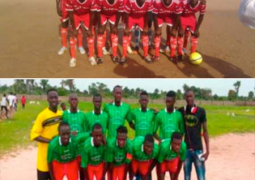The Gambia's
foremost living historian has clocked 80. But Dr Florence Mahoney is more than
a historian; she is also a woman of the arts, heritage, education and the
Church. She is a pioneer promoter of girls' education' and a mother.
She received her BA in history from WestfieldCollege,
University
of London
in 1951, bagged a Post Graduate Degree in Education from Oxford
in 1952, and a PhD in history 1963 from the highly respected of School
Oriental African Studies, University
of London.
She became the first Gambian woman to earn a PhD, and one of the first African
women to earn such an advance degree in history. Her thesis, 'Government and Public Opinion in The Gambia: 1816-1901 'traces
the contribution of ordinary Gambians in the political and economic evolution
of the colony. With penmanship of the good historian and exhaustive research
from all the possible sources at the time, using all the tools in the
historians' kit, she charts the various attempts to exchange Gambia
for Gabon
and other French territories, and how local people, mainly of the booming Bathurst
mercantile class, fought successfully to thwart all the attempts. In this magnum opus, names like Thomas Joiner,
Robert Ansley, Daniel Goddard, Liz Tigh and other Gambian entrepreneurs of the
19th century come to light.
It has to be said that it was both an intellectual and
physical challenge to do a PhD in African history at the time, especially on a
Gambian topic. Then there were no archives here; the historical materials were
scattered in hundreds of files at the Secretariat, now Quadrangle; and other
offices. It needed patience and stout determination to collate any useable
historical material. A few years later Dr Mahoney chaired the committee
established by the new independent Government to set up a National Archives.
Also, this was a time when African history was still fighting for acceptance as
a legitimate and worthwhile subject of study in Western universities. Only a
handful White Professors like the late Roland Atmore and Roland Oliver of the
SOAS, dared promote the study of African history in European universities. At Oxford,
the Regius History Professor, Trevor- Roper, said at a lecture in 1964 that Africa
had no history: 'there is only the history of Europeans in Africa.
The rest is darkness. And darkness is not the subject of history'. Thus Dr
Mahoney's thesis could be seen as the first riposte to the Regius Professor:
that indeed Africa
had a rich history, worth studying for its glory and accomplishments.
See 'Letter to the editor' Gambia Echo, 27 April 1954,
p.6. Here she protests why no female teachers were among those sent on
government scholarships that year.
See 'Gambian Lady Doctor of Philosophy', Gambia Echo, 13/1/1964,
which reports that she was awarded the degree on 27
November 1963.
See THE 1/1, Gambia
National Archives.
She worked with Mr Smytli, a British Archivist; and FU Allen, a retired civil
servant who knew all the files in the Secretariat in Bathurst.
See 'Trevor Roper on African history', West
AfricaMagazine,
18 January 1964.
Dr Mahoney was never an arm chair historian. She practiced
her trade with clarity of mind, seminal research and robust writing. She has
written many learned articles in the leading history journals of the time like Tarikh, (published at IbadanUniversity),
and the famous Journal of African History (published by CambridgeUniversity
since 1960). She has published four books including the much celebrated Stories of Senegambia (1982); Creole Saga (2007)
and 'Gambian Studies' (2008), a
collection of essays on some salient aspects of 19th century Gambian history.
The latter is available at Timbooktoo bookshop.
Aside doing the craft of the historian, she together with
Bakari Sidibe and SA Bahoum, worked towards the creation of the NationalMuseum;
she helped to prepare The Gambia's delegation to the First Festival of Black
Arts in Dakar,
1966 as head of the Costumes Sub.- committee. More recently, I found it refreshing working under
her advice on the UNESCO Slavery Database project for The Gambia National
Archives.
Her extensive teaching career and work in the church here and overseas I will
leave to more competent persons to adumbrate
Dr Mahoney belongs rightly to the first generation of
trained African historians; in the honoured league of K.O Dike, Jacob Ajayi,
Joseph Anene, Adu Boahen and BA Ogot. At a time when there were doubters over
the relevance or even existence of African history, they stood up to defend Africa's
rich past by studying it, teaching it and writing it for scholarship.
To end this salute to our doyen, I want to say that History
is a developmental subject. It has a role to play in national development
efforts such as poverty alleviation, and forging unity and identity. A study of
past failed projects, epidemics and so on, for example, could be instructive for
the future. Also, when historians are adequately trained in their craft, they
make excellent servants of the state, private and public sectors.
Dr Mahoney's latest book Gambia Studies (187 pages) is
available at Timbooktoo bookshop.
See Hassoum Ceesay (2008), Gambian
Women: an infroductory History, Banjul:
Fuliadu Publishers, p.101-103
See Sally PC Njie (1978), Who is Who in
The Gambia, Banjul:
Government Printer




